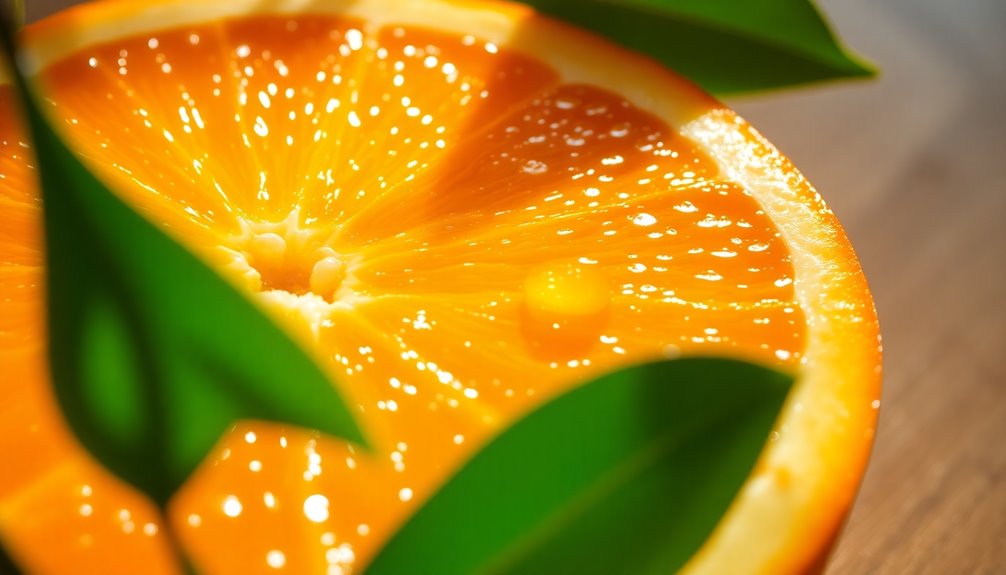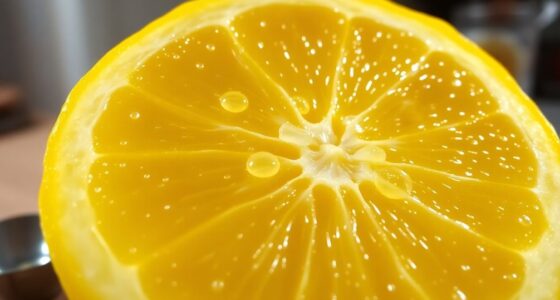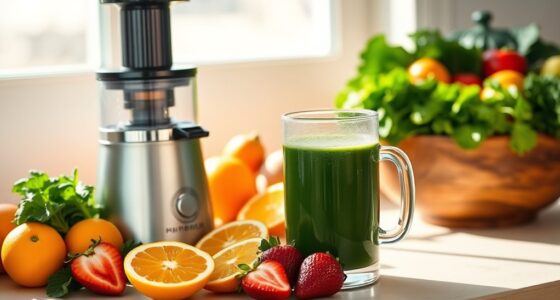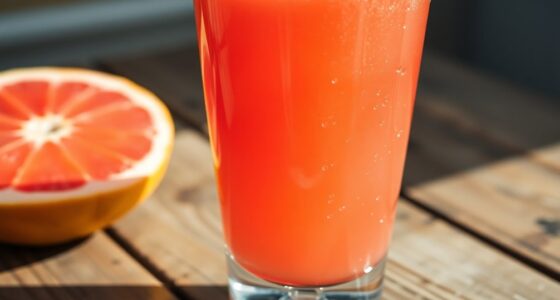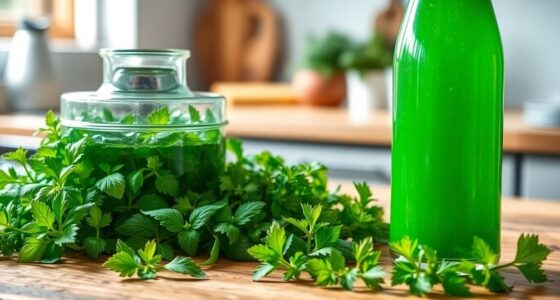A medium-sized orange typically gives you about 4 to 5 tablespoons of juice, which is around a quarter to a third of a cup. If you're aiming for 1 cup of juice, you'll need about 3 to 4 oranges. Keep in mind, the juiciness can vary based on size and ripeness, so it's a good idea to pick ripe ones for the best flavor. There's more to learn about maximizing your juice yield, so stick around!
Key Takeaways
- A medium-sized orange yields about 4 to 5 tablespoons of juice, roughly a quarter to a third of a cup.
- Typically, 3 to 4 medium oranges are needed to produce 1 cup of juice.
- Juiciness varies; larger, riper oranges yield more juice, while smaller or less ripe ones yield less.
- A pound of oranges produces around 8 to 10 tablespoons of juice, helping estimate quantity when purchasing.
- Selecting ripe oranges enhances both juice yield and flavor, making for a better drinking experience.
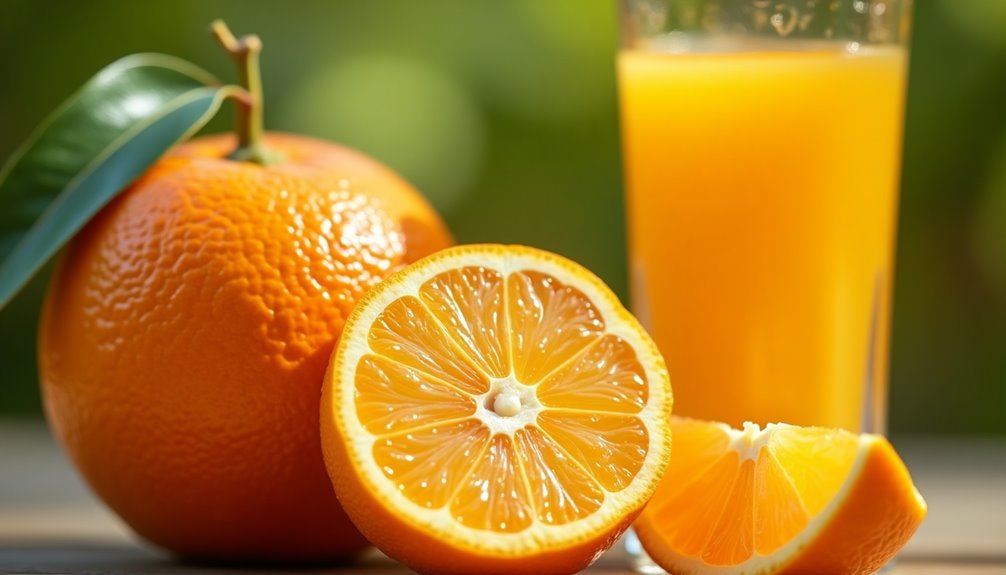
When you squeeze a medium-sized orange, you can expect to get about 4 to 5 tablespoons of juice, which is roughly a quarter to a third of a cup. This means if you're planning to enjoy a refreshing glass of fresh orange juice, you'll need to squeeze multiple oranges to reach your desired amount. For a full cup of freshly squeezed orange juice, you'll likely require about 3 to 4 medium-sized oranges, depending on their size and ripeness.
The yield from each orange can vary significantly based on several factors. While a medium-sized orange typically produces that 4 to 5 tablespoons of juice, you might find that larger, riper oranges can yield even more. If you select the juiciest fruits, you could end up with a little extra juice, which is always a bonus. On the other hand, if the oranges are smaller or not as ripe, you may need to squeeze a few more to reach that full cup.
When you think about the amount of juice you can extract, it's also helpful to consider the weight of the oranges. For instance, a pound of oranges usually yields around 8 to 10 tablespoons of juice, which is about half to two-thirds of a cup. So when you're at the grocery store, it might be worth weighing your selections. Choosing the right oranges could make a noticeable difference in the amount of juice you get.
Freshly squeezed orange juice is known for its vibrant flavor profile—sweet and tangy, a delightful experience that bottled juices often lack. This freshness plays a significant role in taste, as older fruits may not only be less juicy but could also have lost some of that sweet tang. When you choose ripe oranges, you're not just maximizing your juice yield; you're also ensuring that each sip is bursting with flavor.
If you're ever in doubt about how many oranges to buy for your juice needs, remember that you'll need roughly 3 to 4 medium-sized oranges for that coveted 1 cup of juice. It's always a good idea to grab a couple of extra oranges, just in case. After all, nothing beats the satisfaction of pouring yourself a perfectly fresh glass of orange juice, knowing you've got the right amount from your ripe oranges.
Next time you're preparing for breakfast or a refreshing afternoon drink, keep these tips in mind. Knowing how much juice you can get from a medium-sized orange can help you plan better and avoid any surprises. Additionally, freshly squeezed orange juice can be an excellent source of vitamins A, C, and K, which contribute to immune health. So, go ahead, grab some ripe oranges, and enjoy the process of squeezing out that delicious, freshly squeezed juice!
Frequently Asked Questions
How Much Juice Can You Get From One Orange?
When you’re juicing an orange, you’ll typically get around 2 to 3 ounces of juice from a single fruit. The amount of juice you can extract may vary depending on the size and ripeness of the orange. If you often find yourself wondering how much juice in one orange, using a citrus juicer can help maximize the yield. Many people enjoy fresh orange juice not only for its refreshing taste but also for its high vitamin C content, which can be beneficial for overall health.
If you're using a medium-sized orange, expect about 4 to 5 tablespoons, which is roughly 1/4 to 1/3 cup.
The juiciness can vary, so choosing a larger or riper orange might give you more juice.
Navel and Valencia oranges are great options if you're aiming for maximum yield.
How Many Oranges Make 8 Oz of Juice?
Imagine a sunny morning where you savor a refreshing glass of juice.
To whip up 8 ounces of that delightful nectar, you'll need about four medium-sized oranges. Each orange typically gives you about 2 to 3 ounces of juice, so those four should do the trick.
Keep in mind that the size and ripeness of the oranges can affect the yield, so choose fresh ones for the best taste!
How Many Oranges Does It Take to Make 12 Ounces of Juice?
To make 12 ounces of juice, you'll need about 6 to 8 medium-sized oranges.
Each orange typically gives you around 2 to 3 ounces of juice, so it's smart to have a few extra on hand just in case.
Remember, the juice yield can vary depending on the size and ripeness of the oranges, so pick the juiciest ones you can find for the best results.
Happy juicing!
How Many Ml of Juice Are in One Orange?
When you squeeze a medium-sized orange, you'll typically get around 60 to 75 milliliters of juice.
If you're dealing with larger oranges, that amount can climb to 90 to 105 milliliters.
So, the exact yield depends on the orange's size and ripeness.
If you want to make a refreshing drink, keep in mind that you might need several oranges to get the amount you're craving.
Conclusion
In the end, you might find that a single orange can yield anywhere from a quarter to half a cup of juice, depending on its size and juiciness. It's fascinating how such a small fruit holds so much potential—each squeeze releases a burst of flavor that can brighten your day. So, whether you're enjoying it fresh or mixing it into a recipe, remember that a little orange can go a long way in delivering delicious results.
Cindy thoroughly researches juicing trends, techniques, and recipes to provide readers with practical advice and inspiration. Her writing style is accessible, engaging, and designed to make complex concepts easy to understand. Cindy’s dedication to promoting the advantages of juicing shines through her work, empowering readers to make positive changes in their lives through the simple act of juicing.

